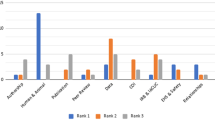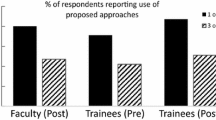Abstract
Responsible conduct of research (RCR) courses are widely taught, but little is known about the purposes or effectiveness of such courses. As one way to assess the purposes of these courses, students were surveyed about their perspectives after recent completion of one of eleven different research ethics courses at ten different institutions. Participants (undergraduate and graduate students, post-doctoral fellows and faculty, staff and researchers) enrolled in RCR courses in spring and fall of 2003 received a voluntary, anonymous survey from their instructors at the completion of the course. Responses were received from 268 participants. Seventy-seven percent of open-ended responses listed specific kinds of information learned; only a few respondents talked about changes in skills or attitudes. The perception that courses did more to provide information than to foster skills or attitudes was verified in quantitative responses (P<0.0001). Over 75% of the respondents specifically noted that courses were useful in preparing them to recognize, avoid, and respond to research misconduct. The two principal findings of this multi-institutional study are that respondents reported: (1) a wide variety of positive outcomes for research ethics courses, but that (2) the impact on knowledge was greater than that for changes in skills or attitudes.
Similar content being viewed by others
References
Eissen A, Berry R. (2002). The Absent Professor: Why we don’t teach ethics and what to do about it. American Journal of Bioethics 2(4): 38.
Anestidou L. (2002). Research Ethics education: the view from below. American Journal of Bioethics 2(4): W5.
NIH: Training grant requirement.(1989). NIH Guide for Grants and Contracts. 18 (45).
NIH: Reminder and update: Requirement for instruction in the responsible conduct of research in National Research Service Award institutional training grants. (1992). NIH Guide for Grants and Contracts. 21(43). 〈http://grants.nih.gov/grants/guide/notice-files/not92-236.html〉.
NIH: Required education in the protection of human research participants. Notice OD-00-039, June 5, 2000. 〈http://grants.nih.gov/grants/guide/notice-files/NOT-OD-00-039.html〉.
Public Health Service: PHS policy on instruction in the responsible conduct of research. December 1, 2000. 〈http://ori.hhs.gov/policies/RCR_Policy.shtml〉.
Steneck NH. (2000). Assessing the Integrity of Publicly Funded Research. Proceedings of the First ORI Research Conference on Research Integrity. 〈http://ori.hhs.gov/documents/proceedings_rri.pdf〉.
Richman K. (2002). Responsible conduct of research is all well and good. American Journal of Bioethics 2(4): 61
Bertolami CN. (2004). Why our ethics curricula don’t work. Journal of Dental Education 68(4): 414–25.
Lewin LO, Olson CA, Goodman KW, Kokotailo PK. (2004). UME-21 and teaching ethics: a step in the right direction. Family Medicine 36(January suppl): 36–42.
Rhodes R. (2002). The pressing need for postdoctoral research ethics education. American Journal of Bioethics 2(4): 1
Sharp R. (2002). Teaching old dogs new tricks: continuing education in research ethics. American Journal of Bioethics 2(4): 55.
Kalichman M, Paik A. (2004). Instructor Perceptions of Goals for Teaching Responsible Conduct of Research. Proceedings of the Third ORI Research Conference on Research Integrity. 〈http://ori.hhs.gov/documents/rri_abstracts_2004.pdf〉.
Committee on Assessing Integrity in Research Environments (2002). Integrity in Scientific Research: Creating an Environment That Promotes Responsible Conduct. Board on Health Sciences Policy and Division of Earth and Life Studies, Institute of Medicine and National Research Council of the National Academies, The National Academies Press, Washington, D.C. 〈http://www.nap.edu/books/0309084792/html〉.
Author information
Authors and Affiliations
Corresponding author
Rights and permissions
About this article
Cite this article
Plemmons, D.K., Brody, S.A. & Kalichman, M.W. Student perceptions of the effectiveness of education in the responsible conduct of research. SCI ENG ETHICS 12, 571–582 (2006). https://doi.org/10.1007/s11948-006-0055-2
Received:
Revised:
Accepted:
Issue Date:
DOI: https://doi.org/10.1007/s11948-006-0055-2




